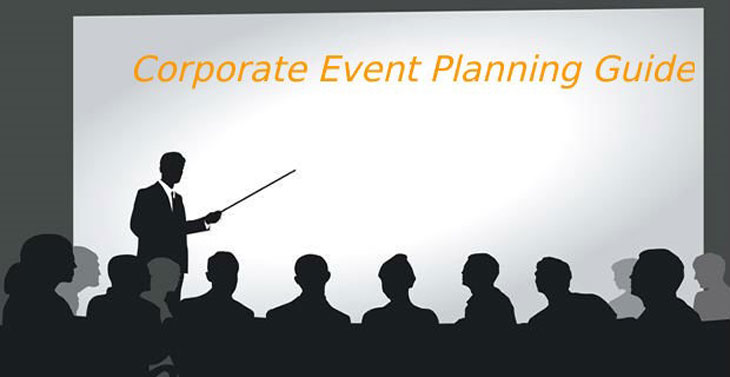
Blog
Corporate Event Planning Guide

A corporate event is a chance to network and to make connections, to learn from the words of wisdom offered by the guest speakers, and to share and gain insights into your industry. However, for the planners and organisers of such an event, it is a chance to succeed or a chance to fail.
To make sure that your event resides in the former camp, you need to plan! Know what you want to achieve, have contingency plans in place if anything goes wrong, and enjoy a great event that goes off without a hitch.
Fortunately, we can help you with this. We have years of experience in providing the very best public speakers for a wide variety of different events, so we know how the little details can change a failure into a success and vice-versa. We distilled this experience into this definitive guide to corporate event planning, for your benefit.
Our guide will take you from the initial planning stages of your corporate event, through the venue selection, the creation of an appropriate theme, securing the perfect guest speaker and handling of the promotional work. In short, we will accompany you from the start, right up to the event itself.
We will cover many of the issues that planners commonly face as they aim to lay the groundwork for a great corporate event, including marrying the theme with the tone and ambience, getting the word out there effectively and finding the perfect and appropriate guest speaker to deliver the oration at the event.
Read on for our definitive guide to planning an unforgettable corporate event.
Chapter 1: What Are Your Event Objectives?
Chapter 2: Selecting The Perfect Corporate Event Venue?
Chapter 3: What Should Be The Best Suited Theme For Your Event?
Chapter 4: Hiring/Inviting The Best Speaker For The Event.
Chapter 5: How Important Promotion Of Your Corporate Event Is?
Chapter 6: How To Gage The Engagement Of Your Audience?

Chapter 1: Defining Success- What Are Your Event Objectives?
To make your corporate event a success, you must first define exactly what success means to you. Too many people rush into their event without setting out a clear objective; don’t be one of them.
Instead, approach your event pre-armed with everything you need to succeed. Begin with a preliminary planning meeting, outlining the aims for your event, and work from there. What constitutes a successful event? What do you want your attendees to take from your event? What sort of topics do you want to cover and to what extent? Answering all these questions will give your team a clear understanding of what needs to be done.
Getting each and every member of your planning team on the same page and reading from the same script early on will prevent some major headaches later in the process.
Some Tips
- Know what you want to achieve. It’s impossible to succeed unless you have parameters in place with which to measure success. Define these parameters early in the planning process and make sure that each part of the plan is moving you closer to fulfilling your goals.
- Get everyone on the same page early on. Your planning team needs to be a well-oiled machine. Make sure that everyone knows their role early on, and knows exactly what they have to do moving forward.
- Set out progress meetings to keep everyone on task. Building a harmonious team is one thing; keeping it that way is another. Schedule a series of meetings throughout the planning period, to make sure everyone is continuing to pull in the same direction.
Treat all new knowledge as a valuable resource. Recording everything gives you something to analyse after the event. When planning a corporate event, it is a given that something is going to go wrong at some point. Don’t worry about this; learn from your mistakes and keep progressing along the event-planning learning curve.

Chapter 2: Location, Location, Location- Selecting the Perfect Corporate Event Venue
The venue in which your event is held is almost as important as the event itself. You can plan everything down to the finest detail but, if your venue is below-par, then your event is going to fall flat.
Start with a thorough assessment of precisely what you need from a venue and work from there. You already have your clearly defined objective from section one of this guide, so how does your venue fit into that vision? The location needs to be easy for your guests to find, big enough to accommodate all attendees and kitted out with all the facilities necessary to accomplish your aims. Make a checklist covering everything you may need before you start to scout out locations.
Only once the planning is out of the way and you know exactly what you need, should you begin to visit potential venues.
Some Tips
- Make a thorough checklist and stick to it. This checklist should tie the venue directly to your event objectives, ensuring that the location you choose is able to effectively meet your needs.
- Search out reviews for each location you shortlist. The internet affords us a free and easily referable resource which can help us to make the right choice. Look for user reviews on independent listings sites like YellowPages.com.au or TrueLocal.com.au to gain a valuable insight into exactly what each venue can provide.
- Speak to people who have used the venue before. Independent testimonies that you can trust are worth their weight in gold and can help you to select the perfect venue which not only meets but surpasses your aims.
- Have a contingency plan in place just in case your venue needs to change. Having a plan B or even a plan C is important and can prevent disruption from unforeseen circumstances. Just make sure that you are ready to spread the word about a change in venue ahead of schedule to make sure attendees head to the right place.
- Make sure to visit the venue in person before you make a booking. Never book a venue on the strength of a review alone.
Check out this recent post on “How Event Planners Can Choose An Innovative Venue”.
A beautiful article which is designed to help event planners directly in how to select an innovative event theme.
Chapter 3: Setting the Tone- Choosing the Theme of Your Event
A theme is an effective way to bring cohesion to your event and to provide a relevant link between each of its components. When selecting the theme, it is important to once again refer to the objectives you outlined in section one of this guide, and to make sure that the theme does not get in the way of your goals.
For example, if you want to give your attendees the opportunity to gain valuable knowledge and insight from your guest speakers in the form of a seminar, then the theme should reflect this. Creative themes with activities that see your attendees working together as teams to accomplish tasks can really boost the feeling of co-operation and development during your event.
If your event is to be a more light-hearted affair – such as an end of year get-together or an annual awards ceremony – then an appropriate theme can be adopted to complement this. Fancy dress, specially-chosen foods and decorations are all effective ways to create this kind of theme.
Some Tips
- Choose a recognisable theme. The theme should tie your event together, not cause confusion amongst attendees. Ensure that the theme you select is a recognisable one, and that the activities, refreshments and dress code of your event are all directly associated.
- Plan thoroughly. A strong theme can only be pulled off if it is consistent throughout the entire event. Accomplish this with thorough planning, regular meetings and progress reports in the period before the event itself.
- Make sure everyone gets the memo. The theme of your event should be featured prominently in your promotional material (more on that later). Half your guests getting the memo regarding your theme and the other half turning up unprepared is only going to put a dampener on proceedings.
- Keep it simple. The more complex the theme, the more that can go wrong. By keeping it simple, you can secure yourself a great event without having to worry about spiralling budgets or any other hiccups on the day.

Chapter 4: Inspiring Words- Inviting a Speaker
Choosing the right speaker can turn a good event into a truly great one which lives long in the memory. No pressure, but this really is an important part of event planning.
For starters, you need a speaker with the skills and experience that are relevant to your industry and event theme. Our speakers database enables you to compare speakers according to their specific field, giving you the opportunity to land a great guest orator who is able to deliver the inspiring talk you need.
The database also helps you to quickly and easily examine the strengths and attributes of each speaker, making it even easier to find the perfect match for your event. Make sure that you book well in advance of your event to avoid disappointment.
Some Tips
- Do your research. The speaker represents an important part of your event, so it is important to treat the decision accordingly. Do research into possible candidates and draw up a shortlist. Double check that each candidate is able to provide what you need.
- Have a plan B. The best candidates have busy schedules, which is a good thing as it reflects their quality! To land yourself time with the most sought after public speakers, you need to book early, and remember to have other options that you can go to just in case.
- Clue your attendees in about your speaker. In order to get the best out of what your speaker is offering, your attendees may need to be briefed. Provide some preliminary information to them ahead of the event.
- Plan your speaker’s timeslot into your event schedule. In order to maximise the impact of your chosen speaker, you need to schedule accordingly. Hold a meeting to decide which timeslot would best suit your event and create an occasion that your guests will remember for a long time to come.
- To find the best in speakers from a range of different fields, take a look at our database.

Chapter 5: Spreading the Word and Drawing a Crowd- Promoting Your Corporate Event
With the event planned to perfection and the guest speakers lined up, the promotion work needs to begin. An event can only be truly great if it is well attended, and this requires some promotional legwork.
Conduct meetings and devise a strategy aimed at getting information regarding your corporate event under the noses of as many people as possible. There are 1,001 ways to do this, and a combined approach usually works best.
Start with the basics: your event’s description. When a potential attendee’s eye is drawn to a flyer, advert or a webpage, it is this description that could make or break that engagement, so it needs to be bold, evocative and positive. When writing the description, explain the benefits that the guest will take away from the event, and focus on how attending your event is the best way to receive those benefits.
Some Tips
- Imagery is important. Striking images on your promotional material are going to draw a lot of attention to your event. This doesn’t necessarily mean that your event needs a logo, but you will need to source some top quality images to accompany your promotional work.
- Diversify your approach. The modern marketer has so many different approaches to choose from, that it would be a shame to select only one. Social media, guest blog posts, poster campaigns, TV and radio ads, print advertising; all of these things can really give your event the platform and exposure it needs.
- Multimedia is your friend. People respond well to video content, and videos can be made relatively easily and inexpensively these days. Use this to your advantage when promoting your event.
- Repeat your email marketing efforts. Send out a marketing email, by all means, but don’t just leave it there. Instead, send out follow-up emails to ensure maximum exposure for your event.
- Choose a strong hashtag. Social media cannot be ignored when promoting corporate events. Choose a hashtag which is short, easy to remember and reflects the event that you are trying to create, then use this to tie your social media promotional work together.
Chapter 6: Getting Attention And Keeping It- Engaging Your Audience

The audience is the boss at your corporate event. Keep your audience engaged and your event is likely to be a success; fail to achieve this – or lose the audience’s attention half way through – and it will fail.
So, how do you keep a roomful of people engaged during the course of your event? Well, hiring a good quality public speaker is a great start. The best public speakers have the oratory skills, the inspiring stories and the engaging insights to keep an audience rapt, so this should be high on your list.
But the most successful event planners don’t put all of their eggs in one basket. Instead, they use a variety of different methods of engagement to provide their attendees with an incredible and inspiring corporate event. Read on to learn more about this;
Some Tips
- Variation is vital. Humans enjoy a variety of mental stimuli, so use this to your advantage at your event. Plan different tasks, activities and spoken word sessions throughout the event to provide variation for attendees.
- Encourage active participation. Utilise open forums and give people the chance to share their ideas. People are far more likely to become engaged and to stay engaged if they feel that they are being listened to.
- Get social media involved. Use the hashtag mentioned earlier in the guide to allow people to share photos, insights and other media throughout the day and beyond, increasing the communal feel of the event.
- Don’t forget to ask for feedback. The smartest people are learning all the time. Remember to ask your attendees to give you feedback on the event. This will help you to make it even better next time around.
Bonus Chapter: More Event Planing Tips
Planning a great corporate event may seem overwhelming at first, but with the right team alongside you and the right planning in place, it needn’t be. By bringing your planning team together and maintaining close communication throughout the process, you are immediately avoiding many of the pitfalls and drawbacks which can affect corporate events, and dramatically boosting your chances of success.
Creating a corporate event can be something of an emotional rollercoaster, but don’t forget to enjoy the ride. Put the time in, put the effort in and – at the end of the day – you will create something that you can truly be proud of.
Comments
Recent Posts
-
Working From Home — Ultimate Security Tips for a Safe Home Office
-
Unexpected Ways Stress Affects Your Body
-
The Worst Mistakes to Make When Working from Home
-
The Undeniable Worst Mistakes to Make in a Meeting
-
The Top 6 Myths About Leadership Debunked
-
The Best Apps for Busy Professionals
-
Is Telecommuting the Answer to Work-Life Balance?
-
The Importance of Career Goals to Boost Success at Work
-
The Shocking Dangers of Workplace Burnout
-
How to Restart Your Positive Emotions
























